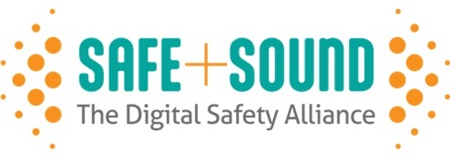To support parents in navigating the complexities of today’s digital age, in which children can access inappropriate content, experience cyberbullying, suffer mental distress and addiction by using their screen devices, Nicklaus Children’s Hospital, the Digital Health Institute for Transformation (DHIT) and other key community partners today announced the formation of The Digital Safety Alliance and launched the Safe+Sound initiative.
Safe+Sound provides information and resources regarding the impact and long-term effects of digital technology – including smartphones, tablets, computers and gaming devices – on the well-being of children and families, as research shows a growing correlation between internet and social media access by children and an increase in suicidal thoughts, depression, psychological distress, eating disorders, disrupted sleep patterns, addiction and other health-related concerns.
“Most parents today grapple with the question of what age is best for children to be allowed to use a cellphone,” said Matthew A. Love, president and CEO of Nicklaus Children’s Health System. “While there is no one-size-fits-all answer for every child, studies show after years of research that cellphones, social media, and other digital technologies, can have alarming effects on children. Parents are the first line of defense in setting boundaries for digital device usage. We want them to be informed before deciding when to give their kids a smartphone.”
The Digital Safety Alliance seeks to convene parents, educators, healthcare professionals, law enforcement and elected officials, and corporate leaders from across the ecosystem, including Troomi Wireless, that has introduced a child-safe cellphone that limits children’s access to certain materials and adjusts as the child matures. The goal is to serve as a think-tank to provide national awareness, best practices, vetted resources, and advocate for digital safeguards and industry standards.
Meanwhile, the Safe+Sound awareness campaign includes a website with vetted information, news articles, blogs, and research that parents, guardians, educators, and healthcare professionals can access with extensive data, including studies on the benefits of smartphones, the risks and challenges they present, age-appropriate guidelines, the effects of digital technologies on mental health, sleep deprivation, school attention span, social skills development, and the risks of comparison culture, cyberbullying, online predators, access to pornography, teen drivers accident rates, blurring of virtual reality, digital addiction, and much more. It also includes an electronic booklet to support parents in determining when is a good time to offer their child a digital device and strategies for optimizing safety.
“Children and teens often have unfettered access to devices, as well as social media and other online platforms,” said Dr. Marisa Azaret, director of clinical psychology at Nicklaus Children’s Hospital. “During these years, young people increasingly crave social rewards — like attention and positive feedback from their peers — before they’ve fully developed the ability to inhibit their behaviors and resist temptations associated with social media. Many young people use social media to compare themselves to others and base their self-worth on superficial metrics such as ‘likes,’ rather than seeking out healthy, successful relationships. Oftentimes, children and teens recognize that their media use is negatively affecting their self-esteem. They want to stop the cycle but don’t know how to do it and crave the help of parents or other adults in their life to address this. Ultimately, it takes a great deal of family communication and empathy to develop a plan of action.”
A press conference to make the announcement was held this morning at Nicklaus Children’s Hospital, featuring Love, Dr. Azaret, Leyan Phillips, co-founder of the Digital Health Institute for Transformation, and Bill Brady, CEO of Troomi Wireless.
“As a father of two boys, this issue is near and dear to my heart,” offered Phillips, who serves on the advisory board of The Digital Safety Alliance. “Responsible parenting in today’s world requires us to be more tech savvy than ever before, which can be challenging for us adults. Kids are not only being influenced by peers at school. They are being influenced by strangers on the internet and are being exposed to content that they may not be ready for. We need to raise awareness of the risks and that’s what the Digital Safety Alliance is all about.”
“Numerous problems can be avoided if kids aren’t given more technology than needed for the developmental stage they’re at,” stated Brady, who himself is a father of five. “It’s impossible to put the genie back in the bottle once kids get immersed in things like social media. The key is getting parents engaged so that children can avoid the negative effects before it’s too late.”
“Smartphone use is reported as a problem in one of every four children and young people associated with mental health issues,” added Love. “At Nicklaus Children’s Hospital, we want to be at the forefront of making sure that when children access this fast-evolving technology on their phones, they are safe and sound. It’s part of our commitment to the health and wellbeing of the most vulnerable members of our society; our kids.”
For more information, visit the Nicklaus Children’s Safe+Sound website: http://digitalsafetyalliance.org

About the Digital Safety Alliance
Under the umbrella of Nicklaus Children’s Hospital and the non-profit Digital Health Institute for Transformation, the Digital Safety Alliance will serve as a think-tank comprising parents, educators, healthcare providers, hospital administrators, national corporate partners, policymakers, and law enforcement officials to raise awareness, share best practices, and create a safer digital environment for kids. Forming an alliance of key stakeholders, the organization hopes to shine a national spotlight on this important issue and provide information, tools, educational programming, and resources to empower parents to make informed decisions when it comes to the digital safety of their children and advocate for digital safeguards and industry standards.